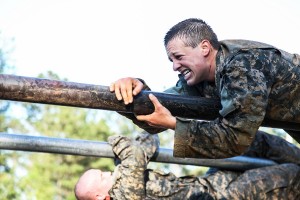
Current and Past SOCOM Commanders Split on Women in Combat
The current and former heads of U.S. Special Operations Command (SOCOM) split last week on lifting the restrictions on women in combat in special operations and throughout the military.
Army Gen. James Votel, who has led SOCOM since last August, backed the policy of the Obama administration and the Pentagon in stating that women who can meet the standards should be allowed to serve in previously restricted Military Occupational Specialties.
Standards are “absolutely the bottom line,” Votel said at the Aspen Security Forum in Colorado last Friday. “This is about meeting the standards for the task that the nation expects us to be able to do. If people can meet the standards, then we should be able to integrate them.”
In a separate panel at Aspen, retired Adm. Eric Olson, SOCOM commander from 2007 to 2011, said that the military and the nation must look beyond standards in making the decision and view women in combat in another context.
“I think that we are only having part of the discussion on women in combat,” Olson said in a separate panel discussion at Aspen. “I think that we need to ask ourselves as a society if we are willing to put women in front-line combat units to take the first bullet on target.”
Olson continued: “Are we willing to cause every 18-year-old girl to sign up for selective service? Are we willing to cause women to serve in infantry units against their will as we do men?”
“About 30 percent of infantry units are men who didn’t volunteer to be in front-line combat, and if we are willing to order women into combat — not just let them volunteer for it — then that is an entirely different discussion.”
Both Votel and Olson noted the success in Afghanistan of the all-female Cultural Support Units, in which women volunteers served alongside special operations troops to engage with women in local communities.
“In many ways, SOCOM has been at the leading edge of integrating women into critical positions,” Votel said.
“In my experience, our use of cultural support teams-where we’ve taken female soldiers from across the variety of specialties, given them special training, and put them with our strike forces out in Afghanistan, and really opened up 50 percent of the population that we just could not get to as males. And so it was definitely value-added,” Votel said.
While applauding the work of the Cultural Support Units, which he promoted as SOCOM commander, Olson urged caution in citing them as an example for the integration of women into combat roles.
“I will just remind you that their role on target was to be women, not to be combat soldiers, and the first thing they did when they fast roped out of the first helicopter on the target was to take their helmet off, let their hair down and corral the women and children and have a very important mission on the target that only they could do,” Olson said.
“And I think that expanding that kind of role for women in ways that women can perform that men can’t is something I think we ought to seek every opportunity to do,” he said.





Leave a Reply